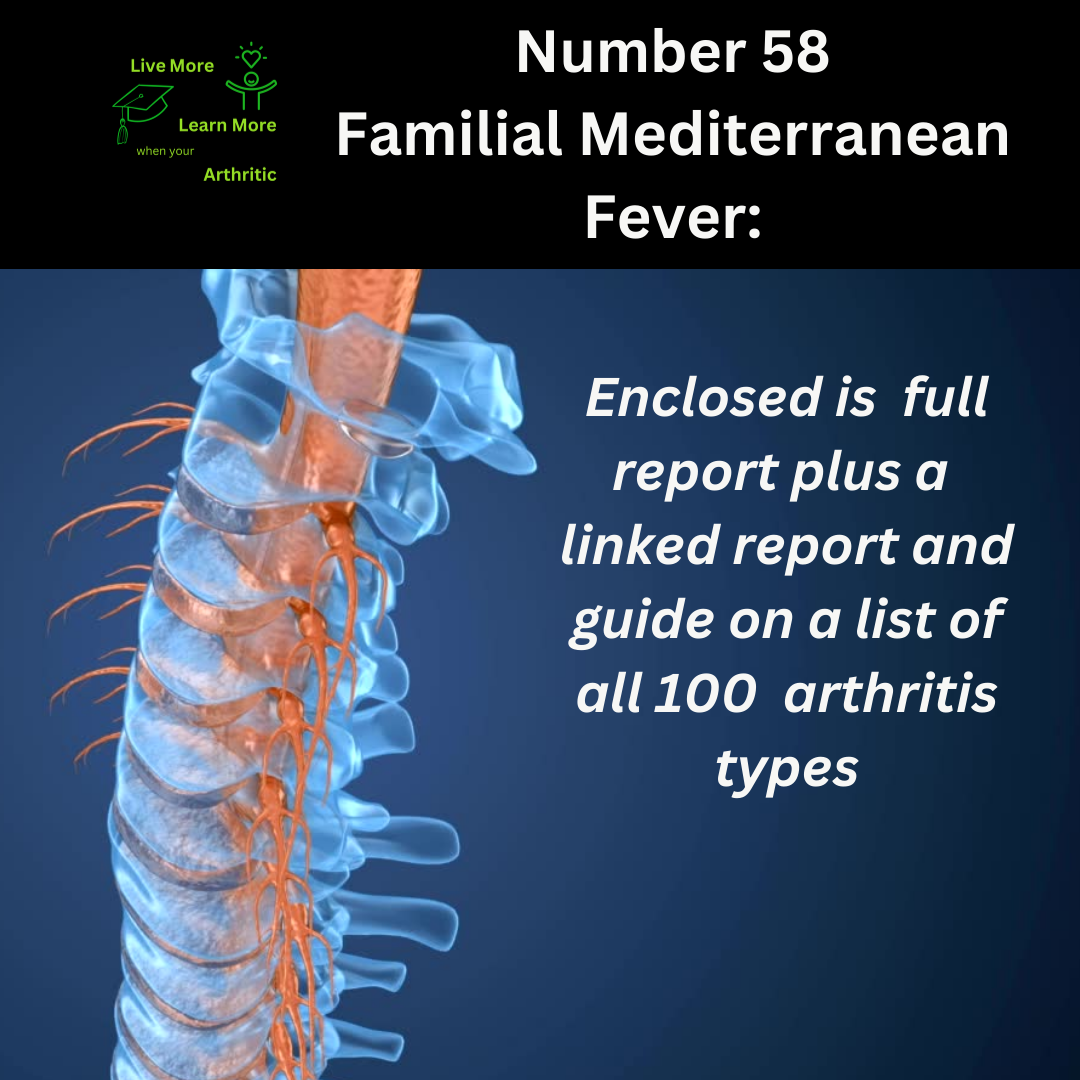
Familial Mediterranean Fever: Number 58 on the list of 100 types of Arthritis
Navigating Familial Mediterranean Fever: A Journey of Resilience and Hope
In the intricate fabric of human health, certain conditions present unique challenges that can reshape lives and inspire resilience. Familial Mediterranean Fever (FMF), a genetic disorder with ancient roots, is one such journey—an odyssey marked by a blend of symptoms, scientific understanding, and the pursuit of a better quality of life.
 Unveiling Familial Mediterranean Fever
Unveiling Familial Mediterranean Fever
Imagine a condition where recurrent bouts of fever, abdominal pain, and joint inflammation strike unpredictably, disrupting the rhythm of daily life. This is the hallmark of Familial Mediterranean Fever, a rare autosomal recessive disorder characterized by periodic inflammatory attacks.
Description of the Disease
FMF stems from mutations in the MEFV gene, which encodes a protein called pyrin. Pyrin plays a crucial role in regulating inflammation within the body. Mutations in MEFV result in dysregulated immune responses, triggering episodes of inflammation that primarily affect the serosal membranes lining the abdomen, joints, and sometimes the lungs.
Causes and Triggers
The underlying cause of FMF lies in genetic inheritance, with affected individuals inheriting two abnormal copies of the MEFV gene (one from each parent). While the genetic basis is clear, the precise triggers for inflammatory attacks remain multifactorial and may include stress, infections, or certain foods.
Symptoms and Impact on Quality of Life
FMF typically manifests with recurrent episodes of fever lasting 1-3 days, accompanied by abdominal pain resembling acute abdomen, joint swelling (arthritis), and occasionally chest pain due to pleuritis. The hallmark of FMF is its episodic nature, interspersed with symptom-free intervals.
Age of Onset and Lifespan Considerations
FMF often presents in childhood or adolescence, although adult-onset cases can occur. The prognosis for individuals with FMF is generally favorable with appropriate management, and it does not significantly shorten lifespan. However, uncontrolled inflammation can lead to complications such as amyloidosis, affecting long-term outcomes.
Achieving Quality of Life with a Proactive Approach
A proactive approach to managing FMF involves early diagnosis, lifestyle modifications, and timely intervention during acute attacks. Regular follow-up with a rheumatologist or genetic specialist is crucial to optimize treatment and prevent long-term complications.
 Possible Complications and Breakthroughs
Possible Complications and Breakthroughs
Complications of untreated FMF may include systemic amyloidosis—a condition where abnormal protein deposits (amyloids) accumulate in tissues, particularly the kidneys, leading to organ dysfunction. Breakthroughs in research focus on identifying novel treatment modalities and optimizing existing therapies to mitigate disease burden and improve outcomes.
Demographics and Gender Disparities
FMF affects individuals of Mediterranean descent more frequently, including populations from Turkey, Armenia, and other Mediterranean countries. While FMF can affect individuals of any gender equally, some studies suggest a slightly higher prevalence in males.Interconnected Health Considerations
Individuals with FMF should be aware of potential complications related to chronic inflammation, such as secondary amyloidosis and increased susceptibility to infections. Regular surveillance for amyloidosis and collaboration with specialists in nephrology and gastroenterology are essential components of comprehensive care.
In essence, Familial Mediterranean Fever is a testament to the resilience of individuals and families facing rare genetic disorders. By embracing a proactive approach, fostering community support, and leveraging scientific advancements, those affected by FMF can navigate their journey with courage and hope, rewriting the narrative of their lives one chapter at a time.